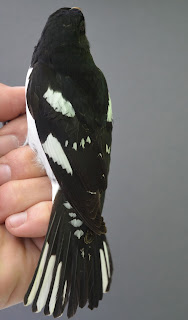 |
| Magnolia Warbler |
A Rainy Morning at Erie Bluffs
Apart from being 15 miles west of Presque Isle State Park and on a road that's undergoing several construction projects, the most difficult thing about Erie Bluffs is that the doughnut place I drive past is closed on Mondays. Good for the diet, not so much for my sweet tooth. On the bright side, it does open at 5 AM the other days of the week
This morning began overcast and with the occasional sprinkle. I debated whether it was worth setting up the nets, but decided to go for it. I only put up six of them and promptly closed them 2 hours later in order to process the 40 or so birds that I'd caught. Unfortunately, by the time I was ready to reopen them it was raining steadily, so I called it a day after clearing another net lane.
My goal is to get a nice portrait of every species we band this spring, so here are my latest efforts at a good photo of a catbird.
I didn't have to try too hard with this guy; the males are striking.
 |
| Black-throated Blue Warbler |
I aged him as an SY, as there's a lot of contrast between the greater and primary coverts.
Luckily, I recaptured a male Rose-breasted Grosbeak that I'd forgotten to photograph the last time I was here. He was initially banded as an SY at Erie Bluffs in 2009, so he's four years old now.
You can see how black his flight feathers are compared to the SY male from my previous visit here.
Not only do the males have a rosy breast, but a rosy underwing lining as well.
The female has a lemon-yellow underwing lining.
I finally caught one of these, thereby completing the mimid trifecta of Gray Catbird, Northern Mockingbird and Brown Thrasher. I'd be extraordinarily excited if I caught another species of thrasher, but that's extremely unlikely to happen in this part of North America.
 |
| Brown Thrasher |
I also caught my first female Eastern Towhee. I've been hearing them every day at each of the sites, but for some reason they seldom fly into the nets.
She has a brown head and back, in contrast to the male, whose back and head are black.
You can also see that she's an Eastern Towhee. She doesn't have any white spots on her back, which is how you separate her from her western counterpart, the Spotted Towhee.
I'm enjoying my new neutral background. Here's a shot of my "studio" and one of my subjects.
Tomorrow I'll be banding at Fry's Landing, weather permitting.












No comments:
Post a Comment